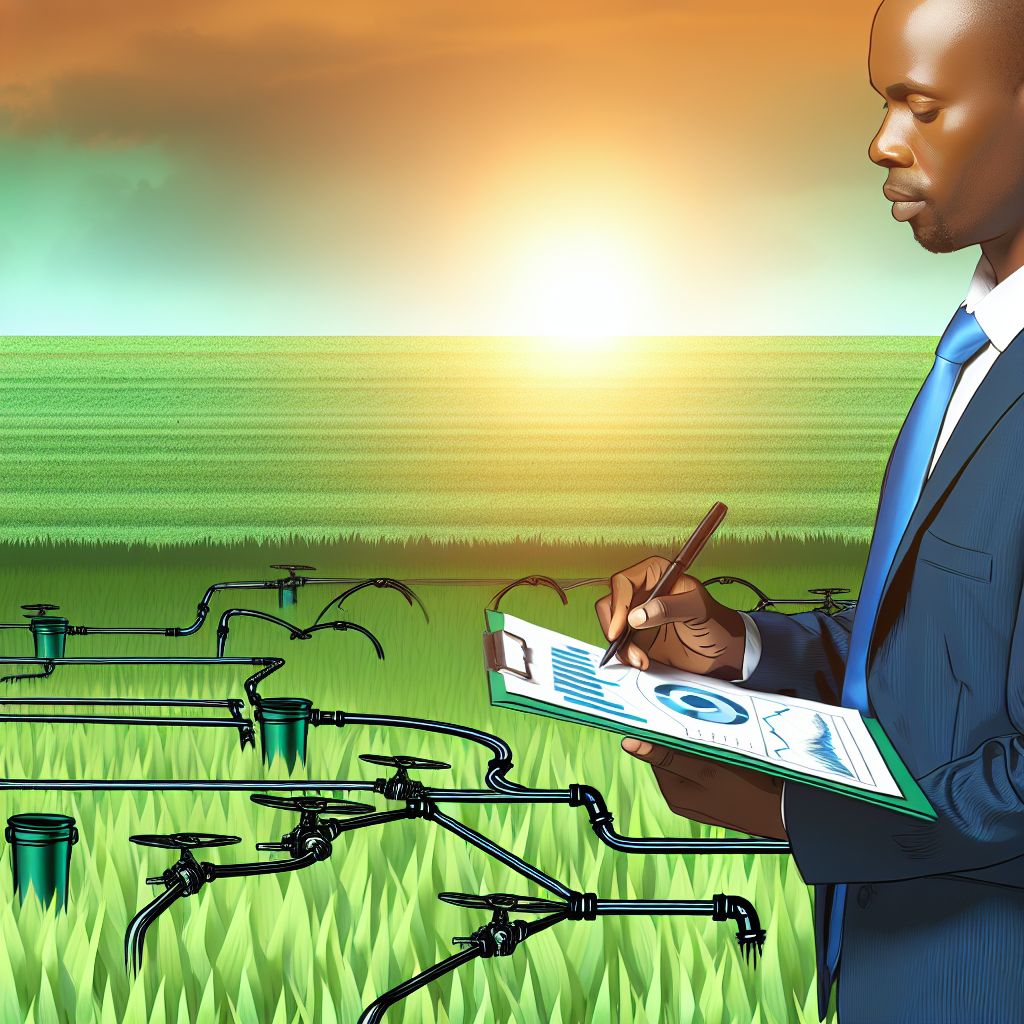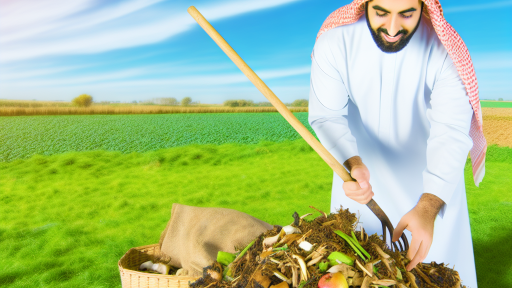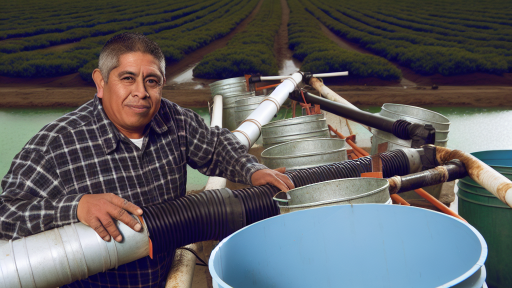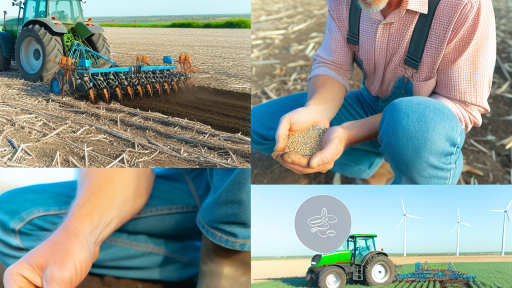Introduction to Smart Irrigation Controllers
What Are Smart Irrigation Controllers?
Smart irrigation controllers are automated devices designed to optimize water use.
They adjust watering schedules based on weather conditions and soil moisture levels.
These systems help conserve water while maintaining healthy landscapes.
How They Work
Smart controllers use sensors to gather data about environmental conditions.
The data informs the system when to water and how much to apply.
Additionally, many models connect to local weather stations or online forecasts.
This connectivity enhances the efficiency of irrigation practices.
Benefits of Smart Irrigation Controllers
- They reduce water waste by delivering precise amounts of water.
- These systems save money on water bills by minimizing usage.
- They promote healthier plants through optimal watering schedules.
- Smart controllers enhance convenience by automating watering tasks.
- They provide real-time monitoring for immediate adjustments if necessary.
Choosing the Right Controller
Selecting a smart irrigation controller involves considering various factors.
First, evaluate the size and type of your landscape.
Next, determine which features best suit your watering needs.
Compatibility with existing irrigation systems is also vital.
Lastly, consider your budget and the potential long-term savings.
Benefits of Using Smart Irrigation Controllers
Improved Water Conservation
Smart irrigation controllers optimize water usage effectively.
They ensure plants receive the right amount of water.
This technology reduces water waste significantly.
Transform Your Agribusiness
Unlock your farm's potential with expert advice tailored to your needs. Get actionable steps that drive real results.
Get StartedAs a result, users can conserve precious water resources.
Cost Savings
Reducing water usage lowers utility bills.
Smart controllers also decrease maintenance costs.
They minimize the need for manual adjustments.
In turn, this leads to higher overall savings.
Enhanced Plant Health
These controllers promote healthier plants and landscapes.
They deliver precisely timed irrigation schedules.
Moreover, they help prevent overwatering and underwatering.
Healthy plants lead to robust garden ecosystems.
Customization and Flexibility
Users can easily customize watering schedules.
Smart controllers allow adjustments based on seasons.
They accommodate different plant needs effortlessly.
Flexibility enhances the user experience greatly.
Remote Management
Most smart controllers offer remote access via apps.
Users can manage their irrigation systems from anywhere.
This convenience allows for timely adjustments.
Remote management saves time and effort for homeowners.
Environmental Impact
Smart irrigation contributes to sustainable practices.
It reduces runoff and minimizes pollution.
By conserving water, it protects local ecosystems.
Therefore, smart controllers support environmental sustainability.
Types of Smart Irrigation Controllers Available
Weather-Based Controllers
Weather-based controllers use real-time weather data for irrigation scheduling.
They adjust watering schedules based on local climate conditions.
This approach helps conserve water and maintain landscape health.
Showcase Your Farming Business
Publish your professional farming services profile on our blog for a one-time fee of $200 and reach a dedicated audience of farmers and agribusiness owners.
Publish Your ProfileMoreover, these controllers can predict rainfall to avoid overwatering.
Soil Moisture Sensors
Soil moisture sensors measure the amount of moisture in the soil.
These devices provide accurate readings to optimize watering times.
They prevent water wastage by indicating when plants truly need irrigation.
Additionally, this technology promotes healthier root development.
Evapotranspiration Controllers
Evapotranspiration controllers use algorithms to calculate moisture loss.
They factor in temperature, humidity, and wind speed.
Through real-time data analysis, these controllers adjust watering automatically.
This method promotes efficient water use based on plant needs.
Advanced Smart Irrigation Controllers
Advanced controllers integrate weather data with sensors for precision watering.
They often connect to apps for remote management and notifications.
This technology allows users to monitor and adjust settings anywhere.
Additionally, many advanced systems provide detailed water usage reports.
Combination Systems
Combination systems merge two or more technologies for optimal efficiency.
These systems may include weather data, soil sensors, and user input.
This hybrid approach maximizes water conservation across various landscapes.
Ultimately, it offers flexibility for different environmental conditions.
Uncover the Details: Conservation Tillage Techniques For Climate Resilience
How Smart Irrigation Controllers Work
Overview of Smart Irrigation Technology
Smart irrigation controllers use advanced technology to manage watering schedules.
They rely on weather data, soil moisture levels, and plant needs.
Furthermore, they help conserve water by optimizing irrigation practices.
Components of Smart Irrigation Systems
These systems consist of several key components.
First, there are sensors that monitor soil moisture content.
Second, weather stations provide real-time climatic data.
Lastly, controllers adjust watering schedules based on collected information.
How Controllers Make Decisions
Smart controllers use algorithms to process data from sensors and weather stations.
They determine when and how much water to deliver.
This automated decision-making minimizes water waste.
Consequently, plants receive the right amount of water at the right time.
Benefits of Using Smart Irrigation Controllers
Using these controllers offers several benefits for homeowners and farmers.
- They significantly reduce water consumption.
- They lower utility bills through efficient water management.
- They promote healthier plant growth by avoiding overwatering.
Integrating Smart Irrigation with Other Technologies
Many smart irrigation systems integrate with smartphone apps and home automation devices.
This allows users to monitor and control their irrigation remotely.
As a result, homeowners can adjust settings from anywhere at any time.
Integration with rainfall data enhances system efficiency further.
See Related Content: Benefits of Carbon Sequestration in Agriculture
Key Features to Look for in Smart Irrigation Controllers
Water Conservation Technologies
Smart irrigation controllers utilize advanced water conservation technologies.
These features adapt watering schedules based on weather conditions.
Moreover, they can reduce water waste significantly.
Some controllers measure soil moisture levels.
These measurements help determine the optimal watering times.
Showcase Your Farming Business
Publish your professional farming services profile on our blog for a one-time fee of $200 and reach a dedicated audience of farmers and agribusiness owners.
Publish Your ProfileUser-Friendly Interfaces
User-friendly interfaces enhance the overall experience.
Many models now offer smartphone app integration.
Thus, users can control their irrigation systems remotely.
Additionally, easy-to-navigate touchscreen displays are common.
This feature simplifies programming and adjustments.
Programmable Scheduling Options
Programmable scheduling options provide flexibility and efficiency.
Daily, weekly, or seasonal schedules can be customized.
Some controllers allow for multiple zone management.
This is ideal for diverse landscapes and plant types.
Furthermore, rain delays can be programmed effortlessly.
Integration with Weather Data
Integration with local weather data improves watering efficiency.
These controllers adjust watering based on forecast predictions.
As a result, unnecessary watering is minimized.
This feature not only conserves water but also saves money.
Additionally, some controllers utilize historical data for optimization.
Connectivity and Smart Home Compatibility
Connectivity features are essential for flexibility.
Many smart irrigation controllers offer Wi-Fi or Bluetooth connectivity.
This compatibility allows for seamless integration with smart home devices.
Users can synchronize their irrigation systems with other smart technologies.
Such systems can enhance overall home automation and efficiency.
You Might Also Like: Restoring Depleted Soils Through Regeneration

Case Studies: Successful Implementation of Smart Irrigation Systems
Introduction to Smart Irrigation
Smart irrigation systems optimize water usage through advanced technology.
These systems utilize sensors and data analytics to enhance efficiency.
Numerous case studies reveal their potential across various landscapes.
Case Study: Green Acres Farm
Green Acres Farm, located in Texas, adopted smart irrigation in 2021.
The farm produces organic vegetables and aims for sustainability.
The installation included soil moisture sensors and weather analytics.
As a result, they reduced water consumption by 30% in the first year.
The farm reported improved crop yield and reduced water costs.
Technology Used
The farm utilized a cloud-based irrigation management platform.
This technology enabled real-time monitoring and adjustments.
Farmers received alerts about moisture levels and weather conditions.
Consequently, irrigation became more targeted and efficient.
Case Study: Riverside Park
Riverside Park implemented a smart irrigation system in 2020.
The city park struggled with water waste and inconsistent landscaping.
They installed an automated irrigation system with weather-based controllers.
The system adjusted watering schedules based on precipitation forecasts.
Within six months, the park reduced water use by 40%.
Benefits Observed
The park reported healthier greenery and vibrant flower beds.
Water savings also led to significant cost reductions for the city.
Showcase Your Farming Business
Publish your professional farming services profile on our blog for a one-time fee of $200 and reach a dedicated audience of farmers and agribusiness owners.
Publish Your ProfileCommunity feedback praised the improved aesthetics and sustainability efforts.
Case Study: Urban Community Garden
A local community garden in Seattle introduced smart irrigation technology in 2022.
The project aimed to engage residents and promote sustainable practices.
The garden utilized moisture sensors and a mobile application for monitoring.
As a result, volunteers could manage watering schedules efficiently.
This improved community involvement and educational opportunities.
Challenges Faced
Initial resistance from community members posed a challenge.
Some were skeptical about the effectiveness of technology.
However, after demonstrating successful water management, opinions shifted.
Education workshops helped residents understand the benefits.
Implications for Sustainable Water Management
These case studies illustrate the impact of smart irrigation systems.
Organizations achieved significant water savings and improved productivity.
Embracing technology can enhance sustainability in a variety of settings.
You Might Also Like: Biodiversity-Friendly Pest Management Tips
Challenges and Considerations in Adopting Smart Irrigation Technology
Initial Costs and Investment
Smart irrigation technology often requires significant upfront investment.
Homeowners must carefully assess their budget before purchasing equipment.
Choices may include hardware and software costs for full system setups.
Additionally, installation costs may vary depending on the complexity of the system.
Technical Knowledge and Skills
Understanding how to operate smart irrigation systems can be challenging.
Users may need training to optimize system performance and efficiency.
Access to technical support is crucial for resolving any potential issues.
Furthermore, keeping software updated requires continuous learning and adaptation.
Environmental Considerations
Smart irrigation systems must align with local environmental regulations.
These regulations may dictate water use and conservation practices.
Additionally, understanding local soil and plant needs is vital for effectiveness.
Failure to consider these factors may lead to inefficient water use.
Compatibility with Existing Infrastructure
Integration with current irrigation systems can present challenges.
Homeowners often need to assess the compatibility of new equipment.
Modifications to existing systems can add to the overall project cost.
In some cases, complete system overhauls may be warranted for efficiency.
Weather and Climate Variability
Weather patterns can impact the effectiveness of smart irrigation technology.
Users must account for seasonal variations in water needs.
In regions with unpredictable weather, flexibility in programming is essential.
Thus, constant monitoring and adjustments may be necessary.
Long-Term Maintenance and Support
Ongoing maintenance is critical for the longevity of smart irrigation systems.
Users should develop a regular maintenance schedule to ensure optimal performance.
Access to reliable customer support can enhance user experience significantly.
Additionally, training for adjustments and repairs may be beneficial.
Future Trends in Smart Irrigation and Water Conservation
Emerging Technologies
Technology continues to transform irrigation methods.
Smart irrigation controllers leverage advanced sensors for optimal performance.
Showcase Your Farming Business
Publish your professional farming services profile on our blog for a one-time fee of $200 and reach a dedicated audience of farmers and agribusiness owners.
Publish Your ProfileThese technologies reduce water waste significantly.
Moreover, software applications enhance user experience.
Real-time data analytics provide actionable insights about water usage.
Integration with IoT
The Internet of Things (IoT) revolutionizes irrigation practices.
Connected devices share data seamlessly across platforms.
This connectivity enables remote monitoring and control.
As a result, users can make informed decisions on water management.
Furthermore, automatic system adjustments optimize water application.
Focus on Sustainability
Sustainable practices gain importance in agriculture.
Smart irrigation supports conservation efforts effectively.
Customers increasingly demand eco-friendly solutions.
Therefore, companies innovate to meet sustainability goals.
Soil health and water retention improve with smart irrigation systems.
Regional Adaptations
Different regions face unique water challenges.
Smart irrigation systems can adapt to local climate conditions.
For instance, desert areas benefit from precise watering techniques.
In contrast, wetter regions may require different strategies.
Customizable systems provide flexibility for diverse environments.
Government Regulations and Incentives
Governments are promoting efficient water use through regulations.
Incentives encourage the adoption of smart technologies.
Programs may include rebates for water-saving devices.
Furthermore, partnerships with local agencies foster innovation.
As a result, more farmers are likely to implement smart solutions.
Additional Resources
Emerging technologies for efficient water use in agriculture: A review …
Model-based smart irrigation control strategy and its effect on water …




